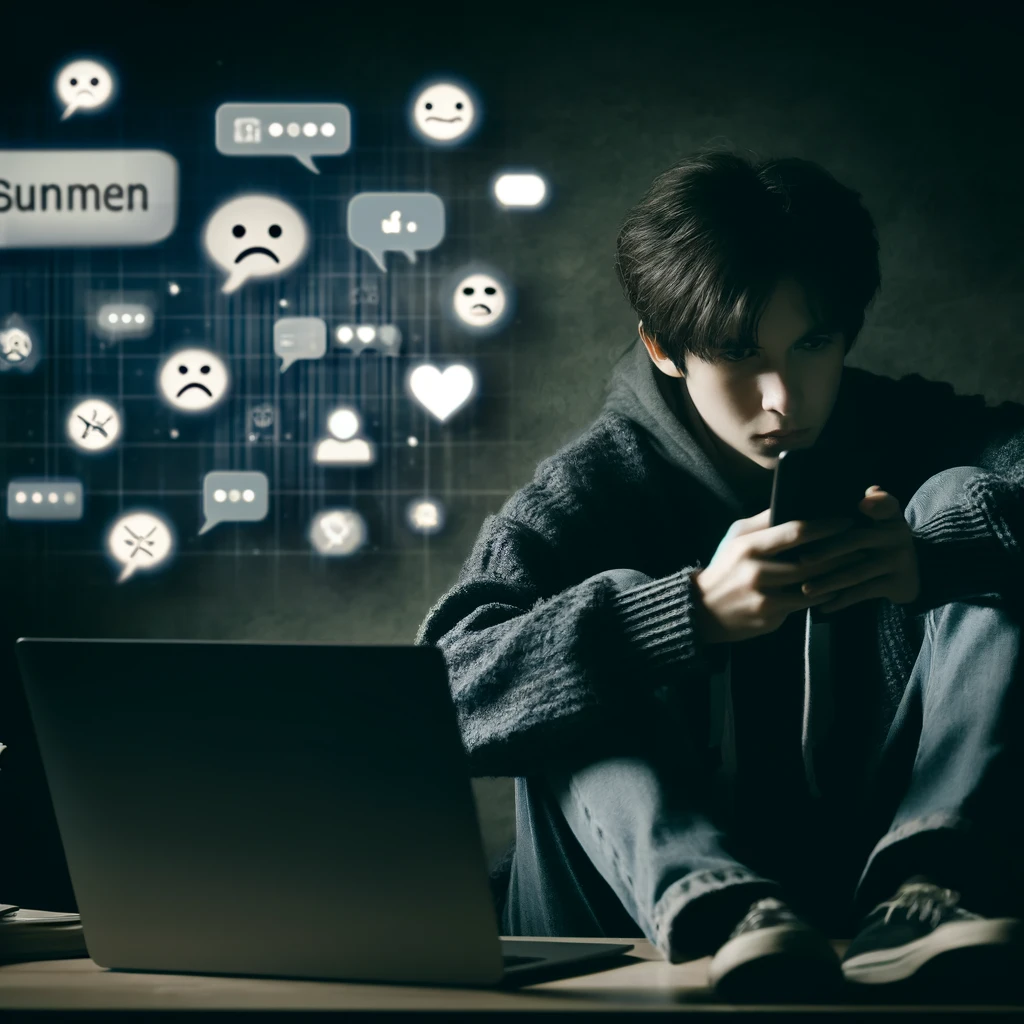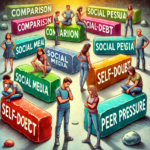Introduction
In recent years, social media has become an integral part of daily life, especially for young people. Platforms like Instagram, Snapchat, TikTok, and Facebook offer unprecedented opportunities for connection, creativity, and self-expression. However, alongside these benefits, there is growing concern about the impact of social media on youth self-image and mental health. This article explores these concerns through statistical analysis, examining how social media influences self-perception, mental well-being, and overall quality of life for today’s youth.
Section 1: Social Media Usage Statistics
Social media usage among young people has seen exponential growth over the past decade. According to a 2023 Pew Research Center report, 95% of teens aged 13-17 have access to a smartphone, and 88% report using social media platforms. The average teen spends approximately 3 hours a day on social media, with platforms like TikTok and Instagram being the most popular.
A study by Common Sense Media in 2022 found that the time spent on social media among teens increased by 17% from 2020, largely driven by the COVID-19 pandemic and the shift towards digital interaction. This surge in usage raises important questions about the long-term effects of such constant engagement on young minds.
Section 2: Self-Image and Social Media
Social media can significantly impact self-image, particularly during adolescence when individuals are forming their identities. A 2021 survey by the Royal Society for Public Health in the UK revealed that 70% of young people aged 14-24 reported experiencing pressure to look perfect online. This pressure often leads to negative self-comparisons, body dissatisfaction, and a distorted self-image.
However, factors like social media, societal expectations, and peer pressure can lead to a distorted self-image. Social media, in particular, often showcases idealized versions of life, making it easy for young people to compare themselves unfavorably and feel inadequate. This constant comparison can lead to negative self-perception and a range of mental health issues.
Body Image Issues: The prevalence of body image issues among social media users is alarmingly high. Research published in the Journal of Youth and Adolescence in 2020 found that 50% of girls and 30% of boys reported negative feelings about their bodies after scrolling through Instagram. The same study indicated that frequent exposure to idealized body images can lead to an increased risk of developing eating disorders and other body dysmorphic conditions.
Self-Esteem Levels: A meta-analysis conducted by the American Psychological Association in 2021 concluded that social media use is linked to lower self-esteem, particularly among adolescents. The constant comparison to curated and often edited images of peers and influencers can create a sense of inadequacy and lower self-worth.
Section 3: Mental Health Impacts
The mental health implications of social media usage are profound and multifaceted. While social media can provide support and community for some, it can also exacerbate feelings of loneliness, anxiety, and depression.
Anxiety and Depression: The 2022 National Survey on Drug Use and Health reported that 25% of adolescents who spent more than three hours a day on social media showed symptoms of anxiety and depression, compared to 13% of those who used social media for less than an hour a day. The link between excessive social media use and mental health disorders is well-documented, with several studies highlighting how online interactions can trigger or worsen symptoms of anxiety and depression.
Stress and Sleep Disturbances: Excessive social media use is also associated with higher stress levels and poor sleep quality. A study by the University of Glasgow in 2020 found that 56% of teens who used social media for more than five hours a day experienced significant stress and sleep disturbances. The blue light emitted by screens and the psychological impact of online interactions can disrupt sleep patterns, leading to further mental health challenges.
Cyberbullying: Cyberbullying remains a significant issue on social media platforms. According to the Cyberbullying Research Center, 37% of young people have been victims of cyberbullying, with 30% experiencing it more than once. Victims of cyberbullying are at a higher risk of developing mental health issues, including severe depression, anxiety, and suicidal ideation.
Section 4: Positive Aspects
While the negative impacts of social media are significant, it is essential to acknowledge the positive aspects that can contribute to a healthier self-image and mental well-being.
Community and Support: Social media can provide a sense of community and belonging, particularly for marginalized groups. Platforms like Twitter and Reddit offer spaces where individuals can find support, share experiences, and seek advice. A 2021 survey by the Trevor Project found that LGBTQ+ youth who used social media to find supportive communities reported higher levels of self-acceptance and lower levels of depression.
Mental Health Resources: Social media platforms have become vital tools for spreading awareness about mental health issues and providing resources. Campaigns like #BellLetsTalk and #MentalHealthAwareness have successfully raised awareness and encouraged conversations about mental health. Many mental health organizations use social media to offer support, share information, and connect individuals with professional help.
Positive Role Models: Influencers who promote body positivity, self-acceptance, and mental health awareness can have a beneficial impact. Accounts that focus on authenticity and vulnerability can help counteract the negative effects of comparison and idealized images. For example, body positivity influencers like Jameela Jamil and Megan Jayne Crabbe have garnered large followings by promoting realistic and healthy self-images.
Section 5: Conclusion
The relationship between social media, self-image, and mental health is complex and multifaceted. While social media offers opportunities for connection, creativity, and support, it also presents significant risks to self-image and mental health, particularly for young people. The statistics highlight the need for a balanced approach, where the benefits of social media are harnessed while mitigating its negative impacts.

Implications for Parents, Educators, and Policymakers:
- Education and Awareness: Increasing awareness about the potential risks and benefits of social media is crucial. Parents, educators, and policymakers should be equipped with the knowledge to guide young people in healthy social media practices.
- Digital Literacy Programs: Implementing digital literacy programs in schools can help young people navigate social media responsibly, recognize unrealistic portrayals, and build resilience against negative comparisons.
- Mental Health Support: Accessible mental health resources and support systems should be promoted both online and offline. Encouraging open conversations about mental health can help reduce stigma and provide the necessary support for those struggling.
Regulation and Oversight: Policymakers should consider regulations that protect young users from harmful content and ensure social media platforms prioritize the mental well-being of their users.
Recommendations for Further Research and Action:
- Longitudinal Studies: Conducting long-term studies on the impact of social media on mental health can provide deeper insights into how prolonged exposure affects self-image and well-being over time.
- Intervention Strategies: Developing and testing intervention strategies that promote healthy social media use and mitigate negative impacts can help create a safer online environment for young people.
- Collaboration: Collaboration between tech companies, mental health professionals, educators, and policymakers is essential to create a holistic approach to addressing the challenges posed by social media.
By understanding the complex dynamics between social media, self-image, and mental health, we can take proactive steps to support the emotional well-being of today’s youth. Balancing the benefits of social media with effective strategies to mitigate its risks is crucial in fostering a healthier, more resilient generation.




